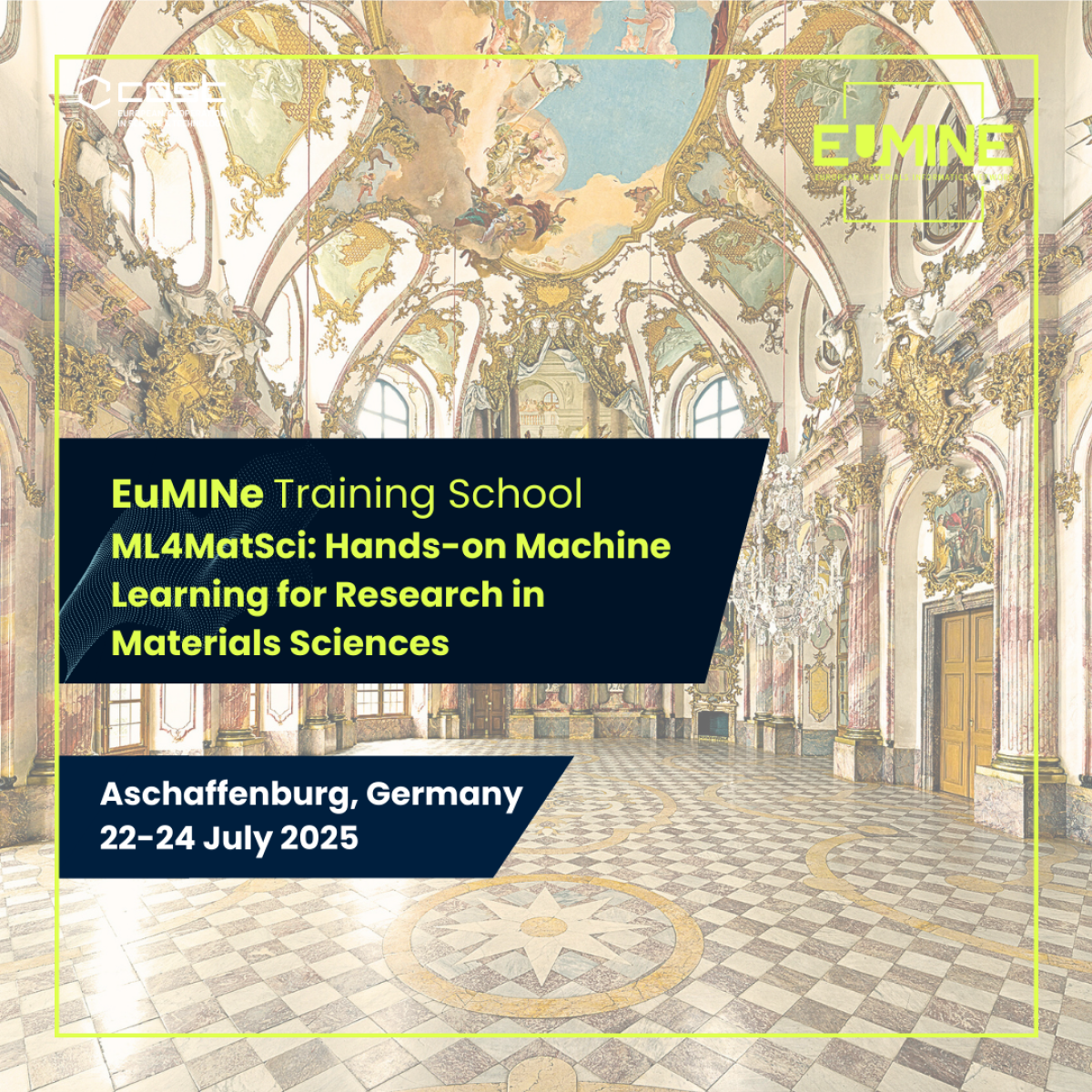
ML4MatSci: Hands-on Machine Learning for Research in Materials Sciences – 22-24 July 2025 (Aschaffenburg, Germany)
ML4MatSci School is designed to equip current and prospective PhD students with the essential knowledge and practical skills needed to apply machine learning techniques in the field of Materials Informatics. Through a combination of lectures, hands-on sessions, and collaborative discussions, participants will gain a solid foundation for integrating data-driven approaches into their research.
🎓 PhD School: Machine Learning in Materials Science
The PhD School equips participants with a solid foundation in machine learning (ML) methods, demonstrated through real-world research led by scientists actively applying ML in their own work.
Our goal is to empower and inspire PhD students to confidently integrate ML into their research, encouraging creativity, critical thinking, and innovation in applying data-driven approaches to materials science and related fields.
🔍 Key Scientific Focus Areas
- Fundamentals of Machine Learning & Artificial Intelligence
Core concepts, workflows, and practical considerations - Image Processing for Materials Characterization
From segmentation to feature extraction in microscopy and beyond - Large Language Models (LLMs) & Their Emerging Applications
Using LLMs for scientific text mining, synthesis, and discovery - Datasets, Data Quality & Evaluation Metrics
How to prepare, validate, and measure the impact of your data - Bayesian Optimization & Active Learning
Smart experimentation and efficient exploration of design spaces - Advanced Topics in AI-Driven Materials Science
Including:- Generative models (e.g., for molecule or structure generation)
- Explainable AI (XAI)
- Multi-modal learning
- AI for materials discovery pipelines
📝 Registration & Abstract Submission
Application
🗓️ Extended Deadline: 11 May 2025 26 May 2025
👉 Apply here
Recommended Prerequisites
To ensure participants can fully benefit from the school, we recommend the following:
- A basic understanding of programming languages, preferably Python or a similar language.
- Enrollment in, or preparation for, a PhD program in physics, solid-state chemistry, materials science, computer science, or a related field.
Financial Support
The EuMINe COST Action is pleased to offer reimbursement for up to 25 participants, covering travel expenses and daily allowances. Participants will be selected based on:
- Interest in the school by submitting a motivation letter and a poster abstract
- Gender and age balance
- Geographic inclusivity, with preference for Inclusiveness Target Countries (ITCs) and Near Neighbour Countries (NNCs)
📅 Important Dates
- Application Deadline:
11 May 202526 May 2025 - Notification of Acceptance:
16 May 202528 May 2025
🎤 Lecturers
- Jacob Goldberger, Bar-Ilan University (Israel)
- Keith Butler, University College London (UK)
- Pascal Friederich, Karlsruhe Institute of Technology (Germany)
- Milica Todorović, University of Turku (Finland)
- Patrícia Ramos, Polytechnic of Porto, INESC TEC (Portugal)
- Michael Moeckel, Technische Hochschule Aschaffenburg (Germany)
- Amila Akagic, University of Sarajevo (Bosnia and Herzegovina)
📌 Preliminary Programme
🗓️ Day 1 – July 22, 2025 (Aschaffenburg)
08:00 – Registration
09:00 – Welcome & Program Overview
09:30 – Introduction to Machine Learning I (Michael Moeckel, Patricia Ramos)
10:30 – 1st Hands-on Session
11:00 – Coffee Break
11:30 – Introduction to Deep Learning and Computer Vision with Applications in Medical Imaging and Explainable AI (Amila Akagić)
12:00 2nd Hands-on Session: Medical Imaging & Explainable AI
13:00 Break
14:00 Industry Session (Jorrit Voigt)
15:00 – Introduction to Machine Learning II (Michael Moeckel)
16:00 – Use Case: Additive Manufacturing
16:30 – Coffee Break
17:00 – Generative Modelling for Property Driven Molecular and Material Discovery (Patricia Ramos)
18:00 – 3rd Hands-on Session
19:00 – Elevator Poster Pitches
20:00 – Poster Session I & Reception
🗓️ Day 2 – July 23, 2025 (Würzburg)
07:45 – Departure from Aschaffenburg to Wuerzburg by bus
09:00 – Arrival & Welcome
10:00 – Uncertainty Calibration (Jacob Goldberger)
11:00 – Coffee Break
11:30 – Bayesian Optimization & Active Learning for Autonomous Decision Making in Materials Optimization (Pascal Friedrich)
12:00 – 4th Hands-on Session: Bayesian Optimization
13:00 – Break
14:00 – On Multilingual Foundation Models (Goran Glavaš)
14:30 – Elevator Poster Pitches
15:30 – Poster Session II
16:30 – Departure and short walk to Wuerzburg residence
17:00 – Guided excursion at the residence: ML4Materials in artwork conservation and reconstruction
18:00 – Free time for socializing, sightseeing and dinner in Wuerzburg
21:00 Departure from Wuerzburg to Aschaffenburg by bus
🗓️ Day 3 – July 24, 2025
08:30 – LLMs for Materials Science (Keith Butler)
09:30 – 5th Hands-on Session on LLMs
10:00 – Coffee Break
10:30 – Advanced Topics (Milica Todorović)
11:30 – 6th Hands-on Session: Advanced Topics
12:00 Closing and departure from Aschaffenburg
👥 Local Organizers and Management
- Michael Moeckel, Technische Hochschule Aschaffenburg (Germany)
- Amila Akagic, Faculty of Electrical Engineering, University of Sarajevo (Bosnia and Herzegovina)
- Francesco Mercuri, National Research Council in Bologna (Italy)
- Local host: NISYS PhD school Aschaffenburg-Coburg-Würzburg
✈️ Getting to Aschaffenburg
Directions to Campus
(Würzburger Straße 45, Aschaffenburg)
✈️ Nearest Airport:
The closest airport is Frankfurt am Main (FRA). From there, you can reach Aschaffenburg Central Station by:
-
ICE high-speed train (approx. 1 hour)
-
Local train (HLB) (approx. 1 hour 15 minutes)
🚆By Public Transport:
Arrive at Aschaffenburg Central Station. From there, you have two easy options to reach the campus:
-
Take the regional train (direction: Miltenberg) and get off at Aschaffenburg Hochschule station.
- Alternatively, take one of the following bus lines: 5, 15, 40, 41, 47, or 63. Get off at the “Hochschule” stop.
🚗By Car from Würzburg:
- Take the A3 and exit at Aschaffenburg Ost
- Follow the B26 and turn left onto Stengerstraße, continuing along the Südring
- After about 2 km, take the exit for Würzburger Straße and turn left
- Campus access: via Flachstraße, then turn left into Bessenbacher Weg
🚗By Car from Frankfurt/M.:
- Take the A3 and exit at Aschaffenburg Stockstadt
- Follow the B8 towards Mainaschaff, then take the B26 exit towards Darmstadt/Stadtring
- Turn onto Westring and continue to Adenauerbrücke/Westring
- Stay on Südring and follow signs to Haibach/Zentrum/Gailbach or Hochschule
- Turn right onto Würzburger Straße
- Campus access: via Flachstraße, then left onto Bessenbacher Weg